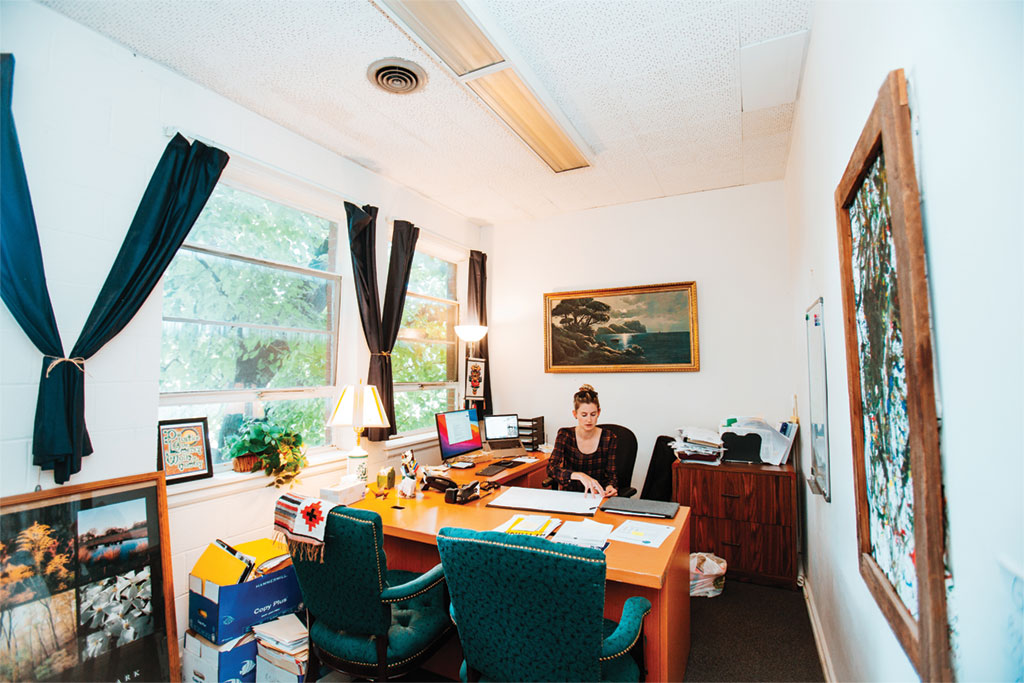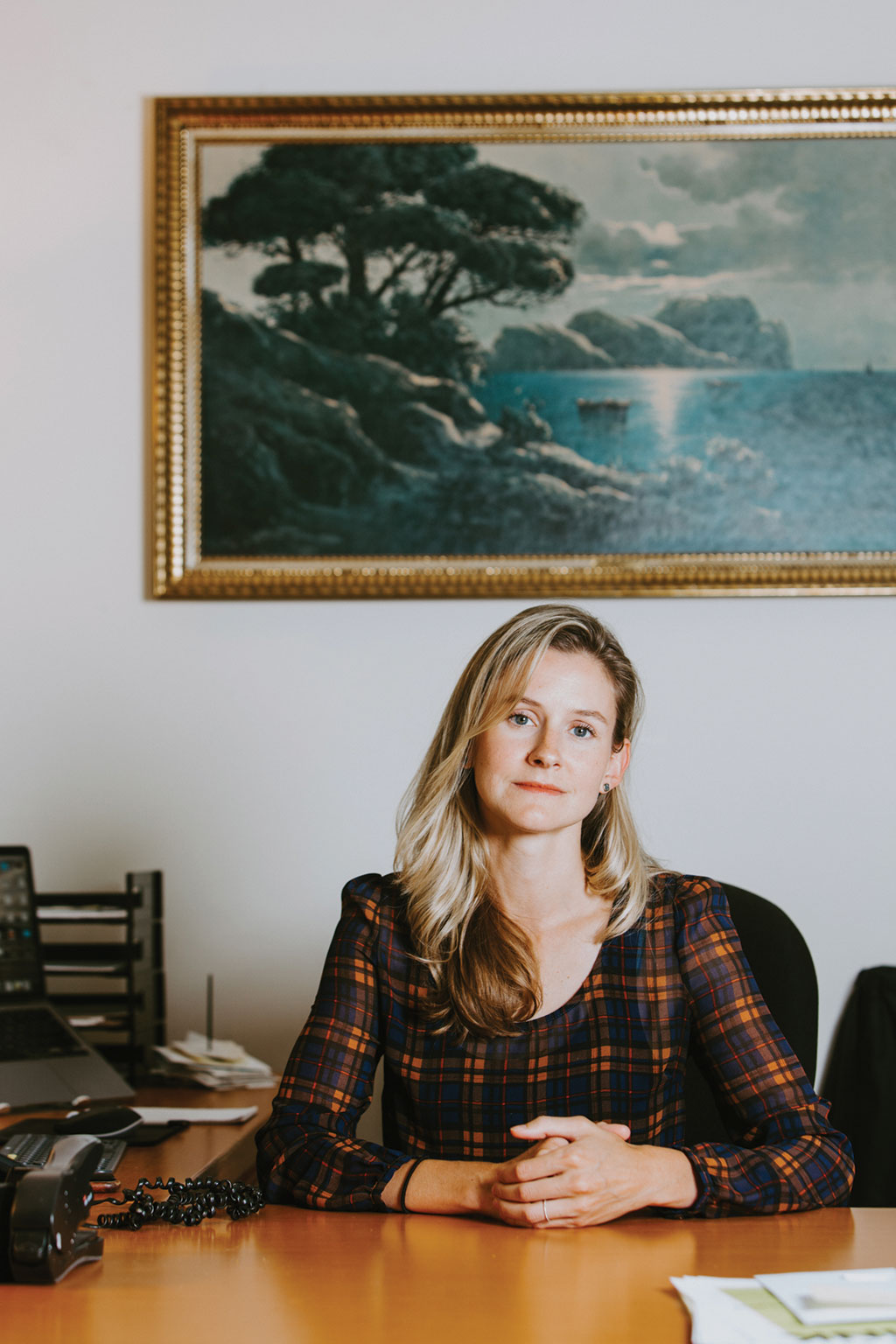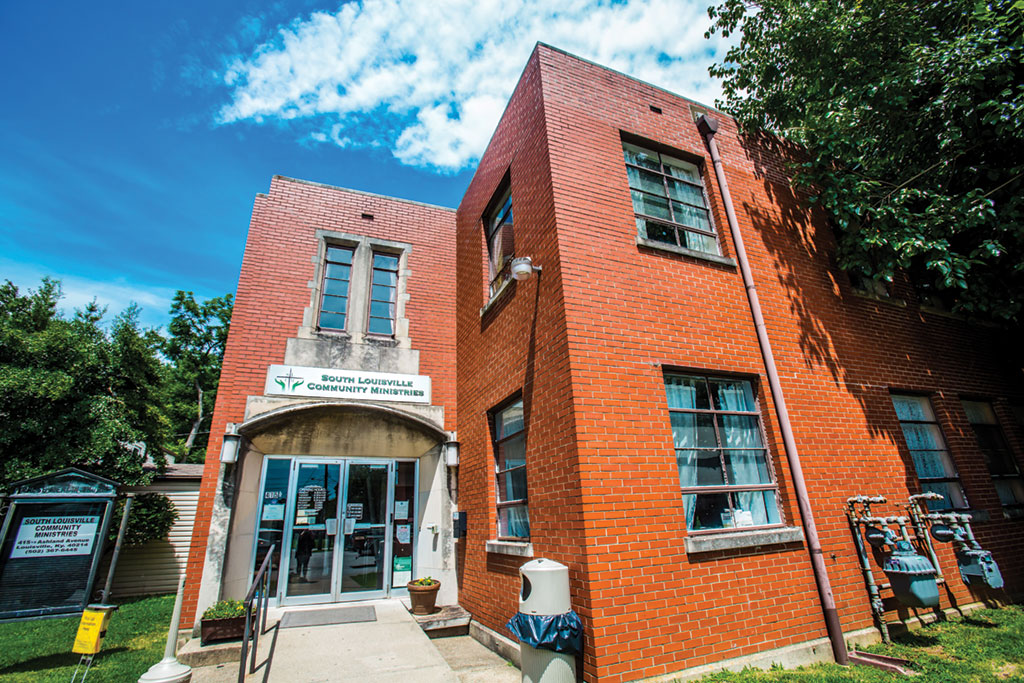"Put a dent in the universe."
BY JENNI LAIDMAN
PHOTOS BY MICKIE WINTERS
How Clare Rutz Wallace, executive director of South Louisville Community Ministries, became a lynchpin in confronting Louisville's eviction crisis during the pandemic.

Clare Rutz Wallace, with wide-eyed baby on her hip, walks through the two-story brick building on Ashland Avenue in Beechmont explaining the story of each disorderly room. Every spare corner of the small space has been rapidly arranged and rearranged (and often re-rearranged) over the last two and a half years as her small team first scrambled to meet the increasing pandemic-related needs of people around the neighborhood where South Louisville Community Ministries resides and, second, performed the impossible.
The impossible: Saving thousands of people around Louisville from homelessness.
On this summer day, every room, except the two where neighbors can pick up food-bank groceries, has the look of a used-furniture showroom after a Black Friday sale. Wallace, her honey-colored hair gathered in a tousled updo, explains how each room has evolved. In her flowy, striped red pants she could pass for a graduate art student, or for a young assistant professor in her large eyeglasses.
Eight-month-old Elowen (her name means elm tree) is silent throughout the tour, looking out at her surroundings with plump contentment in her blue denim sunsuit. A line from one of Wallace’s favorite books, Kurt Vonnegut’s God Bless You, Mr. Rosewater, snaps to mind:
“Hello, babies. Welcome to Earth. It’s hot in the summer
and cold in the winter. It’s round and wet and crowded. At the outside, babies, you’ve got about a hundred years here. There’s only one rule that I know of, babies — God damn it, you’ve got to be kind.”
Eliot Rosewater’s dictum echoes through much of what Wallace does, says and believes: Babies, we’ve got to be kind.
When we first talked, Wallace, the executive director of South Louisville Community Ministries, was staying in her childhood home in Upstate New York, on hand for her younger sister’s Independence Day weekend wedding. She wore a pink plastic flower ring where her wedding ring belonged, her personal penance for losing the real ring while helping her sister plant parsley. Wallace, who turns 35 Sept. 1, is the middle child in a family of seven, perfectly bookended between four siblings, Wallace at the very hub. The position was instructive.
From her place in the middle, growing up in Binghamton, New York, she felt the bonds that stretched in all directions. “When it was time to clean or cook, we all did it,” Wallace says. Family life came with “this constant awareness of what everyone is doing. What do I need to do to be a part of this household?” She says, “I grew up in a magical place.”
The daughter of a dairy-farmer father and a mother who edited a collegiate journal, Wallace’s life felt charmed. “I never wanted,” she says. “We have this huge, beautiful space and parents who showed nothing but love. I was always loved. I could always explore and play and be my own person. ... Everything was just enough, you know? Split-pea soup for two days, I thought that was great. I thought it was enough.”
An observant child, Wallace read her mother’s worried expression at the grocery store. She also noted the gift cards Mom bought for people who needed a little extra. “I was like, Oh, OK. So, we still don’t have more than enough, but because we have enough, we should give.”
Maybe her spot in the middle is the source of her substantial gift — call it her superpower — as a natural connector, a spinner of benevolent webs, a forger of useful networks. It may be why so many people say she was a lynchpin in confronting Louisville’s eviction crisis during the pandemic. It is probably the reason the small South Louisville Community Ministries building, property of Beechmont Presbyterian Church next door, may have been more important to more Louisvillians than any other piece of real estate during the first 18 chaotic months of the pandemic. “No human in the region did more to keep folks in their homes during the eviction crisis” than Wallace, says Drew Tucker, a former community organizer who serves on the ministry’s board. (Tucker is also a strategy director for local company Kertis Creative, which uses space at the Louisville Magazine office.)
“If more people thought like Clare did, more decision-makers, I think we would see a lot better outcomes for people in the community,” says Celine Mutuyemariya, who was a community health worker for Shawnee Christian Healthcare Center during the pandemic and is now an electoral justice organizing director for Black Leadership Action Coalition of Kentucky.
“Clare is one of the best people I’ve ever come across in this work, both at what she does and how she does it,” says Ben Carter, senior litigation and advocacy counsel at the Kentucky Equal Justice Center.
When businesses closed in the early days of the pandemic, Louisville’s slow-burning housing crisis threatened to become a wildfire. City data from 2012 through 2016 had shown affordable housing disastrously insufficient. A 2019 report revealed Louisville needed 31,000 more units for people on the lower end of the income spectrum. The thing is, few in Louisville saw a housing problem.
Homelessness had been largely invisible. Then two projects, the construction of the Lynn Family Stadium in Butchertown and the development of the Waterfront Botanical Gardens not far from there, scraped away longstanding homeless camps. Suddenly, the invisible became visible under many highway overpasses. In 2018, 7,572 people were homeless in Louisville (69 percent in shelters, 30 percent inside for extreme weather, 1 percent on streets or elsewhere). The number of homeless people in Louisville has increased each year since, with 8,745 in 2019 and 9,693 in 2020. Last year, the number was 10,640 (55 percent in shelters, 10 percent inside for extreme weather, 35 percent on streets or elsewhere).

"There's something about Clare Wallace and the way she's able to bridge people and make people feel at home with one another and
inspire people to do this work."
When COVID hit in March 2020, eradicating jobs without warning, those who paid attention to homelessness knew bad could only get worse. Much worse.
Although federal and state eviction moratoriums came to protect at least some renters, these were temporary measures. Agencies began planning for the worst. Wallace was the creator or co-creator of at least three critical organizations that kept people in their homes. All involved forging connections, starting with the gathering of an ad hoc alliance of more than 30 Louisville agencies and interest groups that work on housing issues, an idea hatched by George Eklund, director of education and advocacy for the Coalition for the Homeless, with Wallace’s help. The new ad hoc alliance began meeting weekly via Zoom in May 2020. Wallace also launched StopMyEviction.org in August 2020, making it easier for people all over Louisville to apply for rent assistance. Her third innovation, a regular convocation of social workers called the Louisville Rapid Access Network, served as the backbone of StopMyEviction, troubleshooting the complicated problems tenants faced.
The large alliance of nonprofits, city agencies, lawyers and community health workers that Zoomed each week proved a powerful force in meeting needs, says Ben Carter of Kentucky Equal Justice. “To the extent that Louisville’s response to the eviction crisis was better than other places in Kentucky or better than other cities like Louisville around the nation, it’s because George and Clare convened a coalition of stakeholders,” Carter says.
Tucker says Wallace is the reason it worked: “She brought 50 to 60 people together every week and navigated all their different politics and all their different desires. ... I’ve never seen a human bring people together like that — and don’t get me wrong, every other person there is what I call a superhero, too. They’re all incredibly smart, incredibly dedicated people. But there’s something about Clare Wallace and the way she’s able to bridge people and make people feel at home with one another and inspire people to do this work. I thought: There’s no way in the world this could have possibly happened without her being in it.”
Carter first met Wallace when he hired her as a youth minister for Douglass Boulevard Christian Church in 2014, about a year after she arrived in Louisville from a stint in Senegal for the Peace Corps and other international development work. He realized in their first conversation, “This was a person who wanted to put a dent in the universe.” Now, he says, “Clare and I are riding on the same wave so often.” In fact, everyone I spoke to mentioned how they and Clare were simpatico, in the same groove, in perfect sync. It wasn’t just that they hold similar opinions; it’s that they feel somehow in league with her, kindred spirits in a cause.
Eklund says, “Clare and I are pretty much in lockstep on this viewpoint: I don’t have the ability to fix people.”
Mutuyemariya says, “She’s been a confidant, somebody that I feel really comes from the same philosophy I do as far as systems-level change.”
Kate Husk, who runs the South Louisville Community Ministries’ day-to-day operations, says: “One of the reasons that I think the two of us work really well together is, what frustrates us about the system and what’s going on in the world and everything, we’re on the exact same wavelength. And I think that’s the only reason we can do what we do.”
That ability to make people feel seen, to meet people where they are and focus on the common cause, helped turn the ad hoc alliance into a powerful working group. Among its principal accomplishments was its impact on Louisville’s eviction courts. “Eviction has always been a pretty wild and one-sided court,” says Stewart Pope, advocacy director at the Louisville Legal Aid Society. On a typical day in eviction court pre-pandemic, the court worked through 120 cases in 30 minutes, Pope says. Landlords didn’t need to explain what a tenant did to break a lease and didn’t need to show proof that they were following eviction law. A tenant who missed an eviction hearing was immediately evicted, while landlords were granted extensions. It got even worse for tenants when eviction court reconvened on Zoom in August 2020 with various district court judges rotating in and out every two days.
“I was in court one morning, and the judge didn’t know how to mute anybody,” Pope says. “There was so much noise, you couldn’t hear what was going on in court.” Tenants couldn’t hear to respond to the judge. When they did hear, the judge couldn’t hear the responses. The result of this aural chaos was always the same: eviction. “A few months into it, they changed the Zoom number and IDs that you needed to get in,” Pope says. But people facing eviction hadn’t received the new numbers. On Feb. 1, 2021, the Kentucky Equal Justice Center sued, calling it a violation of tenants’ constitutional right to due process.
As a result of alliance conversations, Pope and others met with district court judges to discuss the problems. Pope says judges learned how to work Zoom, but nothing else changed. Then former district court judge Sadiqa Reynolds, who was the Louisville Urban League’s president and CEO at the time, got involved. On Feb. 12, 2021, she was part of a press conference on the issue. By March, eviction hearings were transforming. Landlords had to prove that they followed eviction law. They had to explain how a tenant violated leases.
Another big step in an improved eviction system was the April 22, 2021, passage of an ordinance written by Metro Councilwoman Cassie Chambers Armstrong that guaranteed legal representation for tenants facing eviction — an effort that relied on information from the alliance. The National Coalition for the Civil Right to Counsel heralded Louisville as the first Southern city to pass a so-called right-to-counsel law, which guarantees money for representation to those who meet income requirements. Today, a social worker is part of eviction court, providing support to tenants going through the process, Wallace says. StopMyEviction gave judges an additional tool for tenants who came before the court, she says. “The next step is, we’re hoping to require mediation between the landlord and tenant so we can, instead of taking all that problem-solving and putting it into 10 seconds in court, having it take place before they go to court,” she says. In addition to mediation, Wallace says, Louisville needs a permanent rent-assistance fund.
When South Louisville Community Ministries launched StopMyEviction on Aug. 30, 2020, they were swamped. “The first day we opened, we had 650 people coming through the intake process,” Wallace says. “Instead of limiting application appointments or the people we could help, we tried to keep the doors wide open so that, A, we could understand the need, and, B, we could help as many people as possible.” South Louisville Community Ministries hired 25 social workers to handle all the applications. Wallace raised the money from private foundations, she estimates about $350,000 for the first year. Wallace’s social workers were not people with social-work degrees. “These were people really passionate about the housing crisis who wanted to get involved,” she says. For some, it proved a steppingstone to certification and full-time social-work positions in town. The second year, the Office of Housing and Community Development picked up the tab for these social workers.
To some degree, StopMyEviction was doing the city’s work. When the federal government funneled dollars toward the eviction crisis, it disbursed the money to local and state governments, which would hand out the dollars to citizens. StopMyEviction made it easier to apply for that money. The city posted its application online and had printed applications available at the city’s eight Neighborhood Place locations. StopMyEviction took several more steps. “Clare’s program was significantly more accessible than the city’s program,” Mutuyemariya says, “because she was thoughtful about things like: What if someone doesn’t have internet? What if someone doesn’t have a way to take a bus or drive? What are the barriers that people could experience? Do we need applications in different languages?” Plus, she had the people to help tenants do paperwork and then stay on top of each case. “The city’s program, you just had to do it. You were on your own,” Mutuyemariya says. The city didn’t assign a specific case worker to each applicant. “So, communication was a big issue. And then the Office of Resilience and Community Services required that people have Social Security cards. Clare’s program did not require that. Why? Because the federal government did not require that. So why is the city adding requirements?” Mutuyemariya says, adding that the city’s program did improve over time and city employees responded to feedback, growing the city’s efficiency.
The result? By the end of May last year, Louisville had given out 90 percent of the first round of federal rent-assistance dollars, a greater share than anywhere else in the country, the U.S. Treasury Department reported. Milwaukee County was second at 79 percent, and the home county of Charlotte, North Carolina, was third at 71 percent. The rest of the nation lagged far behind. At that point, only $1.5 billion of the $25 billion allocated for rent assistance had been distributed nationwide. Ultimately, StopMyEviction worked with 7,600 renters, connecting 3,200 households with more than $20 million in rent assistance from August 2020 to February 2022.
Tucker says it was the human touch that made the difference. “In most cities, when you have to go to get funding, you have to figure it out. You have to chase it down,” he says. “Clare was like, ‘This doesn’t work.’ Social safety nets require humans to connect humans to the things they need.”
This reflects one of Wallace’s core beliefs: Healing comes from our connection to each other. Wallace has a series of clear and graceful essays on the website Medium that are as inspiring as anything you might read this year. And she’s running her organization based on the principles they explore:
- “Healing comes through connection.”
- “Louisville can be the first city where everyone is housed, where everyone, no matter their income, can choose what they eat. We can create local economies to keep money in our neighborhoods. ... I honestly believe this is all in our reach because we know each other.
- “The mission is healing, not changing.”
- “Every human is unshakably good” — a quote from Greg Boyle, a Catholic priest who runs Homeboy Industries, a gang-intervention program in Los Angeles.
- “Storytelling may literally be the only tool in the toolbox for change.”

South Louisville Community Ministries, on Ashland Avenue in Beechmont.
She is putting the power of storytelling to use with a two- year program launched in July called Rethink. It will work
with the Louisville Rapid Access Network, the social-worker group that was so critical to StopMyEviction’s success and is evolving into a collaborative creativity bank. This year, Wallace is the president of the Association of Community Ministries,
the umbrella organization for 13 ministries (including South Louisville Community Ministries) that blanket Louisville neighborhood by neighborhood. (Although Louisville has had community ministries since the 1960s, it wasn’t until 1986, with the establishment of the Fund for Community Ministries, that the organization really took hold.)
Rethink will answer the five questions that Wallace says people always ask about the low-income population:
- Why don’t they just get a job?
- Why don’t they budget better?
- Why don’t they just take the bus?
- Why don’t they find a cheaper apartment?
- Why don’t they go to one of the nonprofits for help?
By looking at what individuals go through to find a job or look for a cheaper apartment, Wallace hopes the Louisville Rapid Access Network will have a clearer picture of the barriers they face. She tells the story of a client she calls Brianna who needs a bus pass so her daughter can get to her grandmother’s house after school, so Brianna can go to work. Brianna’s car won’t run. She bought it from the only place that would consider her for a loan, a buy-here, pay-here car lot, paying $5,000 for a vehicle maybe worth $4,000. Because of a steep interest rate, Brianna actually owes $8,000. Then the engine blows. The car lot offers to put in a new one for $2,000, which means Brianna would owe $10,000 on a car worth maybe $3,000 after repairs. If she tries to sell the car back to the lot and gets $2,000, she’ll still have to pay off an $8,000 loan. Brianna is stuck.
“You get trapped in these systems,” Wallace says. “People are going to say, ‘You know, you shouldn’t have (gone to the high- interest car lot). That was your mistake.’” But Brianna is already kicking herself for that decision. Still, what else could she have done? She needed a car! “We have to do a better job to say, ‘That’s not your mistake; that is the system’s mistake,’” Wallace says. “We are going to help figure out a way to get you out from under this.”
Exploring stories like Brianna’s becomes a form of community assessment. Telling those stories can explain what’s missing in the city, what’s blocking people from having better lives. Wallace says such storytelling can lead to the development of new policies and programs. “It’s just essentially a big communications campaign, honestly, to highlight system failures, but then to really lift up progress and solutions,” she says. The audience for the storytelling is other people in the helping world, as well as decisionmakers, lobbyists and philanthropic organizations. The aim is a culture shift, a wholesale rethink about how our system puts people in impossible positions.
Husk, a 20-year veteran at South Louisville Community Ministries and its assistant director, says Wallace has brought their little six-person agency through more than they ever thought they could handle. From the earliest days of COVID, the demand for emergency services skyrocketed. Before the pandemic, the ministry received an average of 150 requests each month. Once the pandemic started, 300 requests came in monthly for utility assistance alone, plus another 400 every month for rent help. By the end of a year, the number of families they helped rose 500 percent to more than 2,300. The ministry funneled $1.5 million into housing, utilities and medicaiton aid. They kept water and electricity running for 1,650 families. And they did this without their volunteers, most of whom were older than 60 and had to step back because they were most vulnerable to the virus.
“We just did it,” Husk says. “And I think the only reason we could do that was Clare, 100 percent. ... She will get her hands as dirty as they need to be in terms of handholding neighbors through a crisis one minute, and then go and give a spiel to Metro on why we need more money the next.
“Looking back, we took it all in stride and kept running and didn’t stop. We’re only now coming up for air,” Husk says. “The fact is, Clare is still saying yes and troubleshooting and trying to come up with solutions today as she was on day one of the pandemic. And she had a baby in the middle of it.”
And baby: We’ve got to be kind.


